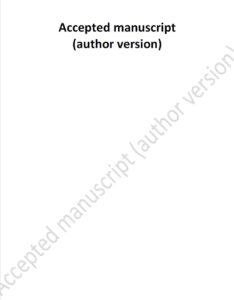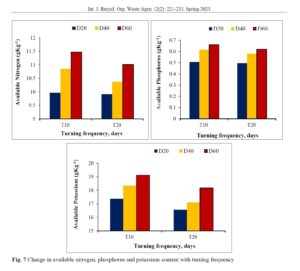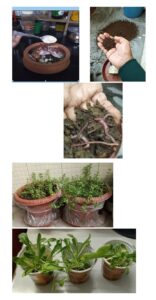Purpose: The present study to investigate the earthworm Eisenia fetida was a chief organism for accumulation of heavy metals (Pb, Cr, and Cd) in their body tissue from sewage sludge with different combinations of animal dung and converted into rich organic vermicompost which plays a beneficial role for environment, animals and human health. Method: Animal […]

Purpose: The study was undertaken with a purpose of at source bioconversion of wet kitchen waste. To accelerate the “Zero Waste Concept” and meet the UN’s Sustainable Development Goals 2015. Method: Wet waste was mixed with dry paper, cardboard material and a microbial culture was inoculated in the bag. Proper mixing of the material enhanced […]
Background: Abundant uses of chemical fertilizers have adversely affected the soil. The large production of livestock dung is recorded in India annually. The presence of abundant agrowastes and animal dung causes serious problems to animals as well as to human beings, due to the improper management of these wastes. Due to the presence of different […]
Purpose The purpose of the study is to evaluate the effect of different animal product wastes and plant compost on survival and growth of earthworm (Eisenia fetida). Methods The study is realized in a vermibin for a duration of 90 days. The initial physico-chemical parameters (pH, humidity, ash, organic matter, carbon, nitrogen, phosphorus and C:N […]
Purpose The study was conducted to develop and assess the feasibility of the low-cost mechanical interface as an alternative to the conventional land-based bin type vermicomposting process. The idea was to reduce the drudgery, enrich the nutrient status and reduce the cost of preparation of vermicompost. Method A smart vermicomposting bin comprising of Arduino, feeding […]

Purpose: The study was undertaken with a purpose of at source bioconversion of wet kitchen waste. To accelerate the “Zero Waste Concept” and meet the UN’s Sustainable Development Goals 2015. Method: Wet waste was mixed with dry paper, cardboard material and a microbial culture was inoculated in the bag. Proper mixing of the material enhanced […]

Purpose Huge quantity of paper mill wastes are dumped at the outskirt of factory as unwanted materials. Vermicomposting is an eco-friendly technique for beneficial conversion of different biodegradable/organic wastes into useful organic manure utilizing earthworms. Solid wastes generated in paper mills contain appreciable quantity of organic matter. Attempt was made for bio-conversion of Emami paper […]